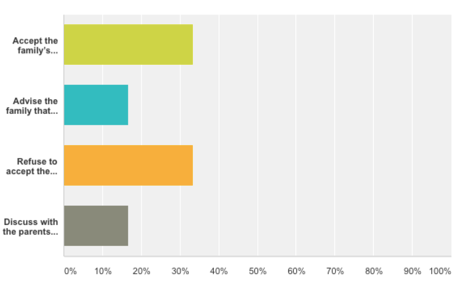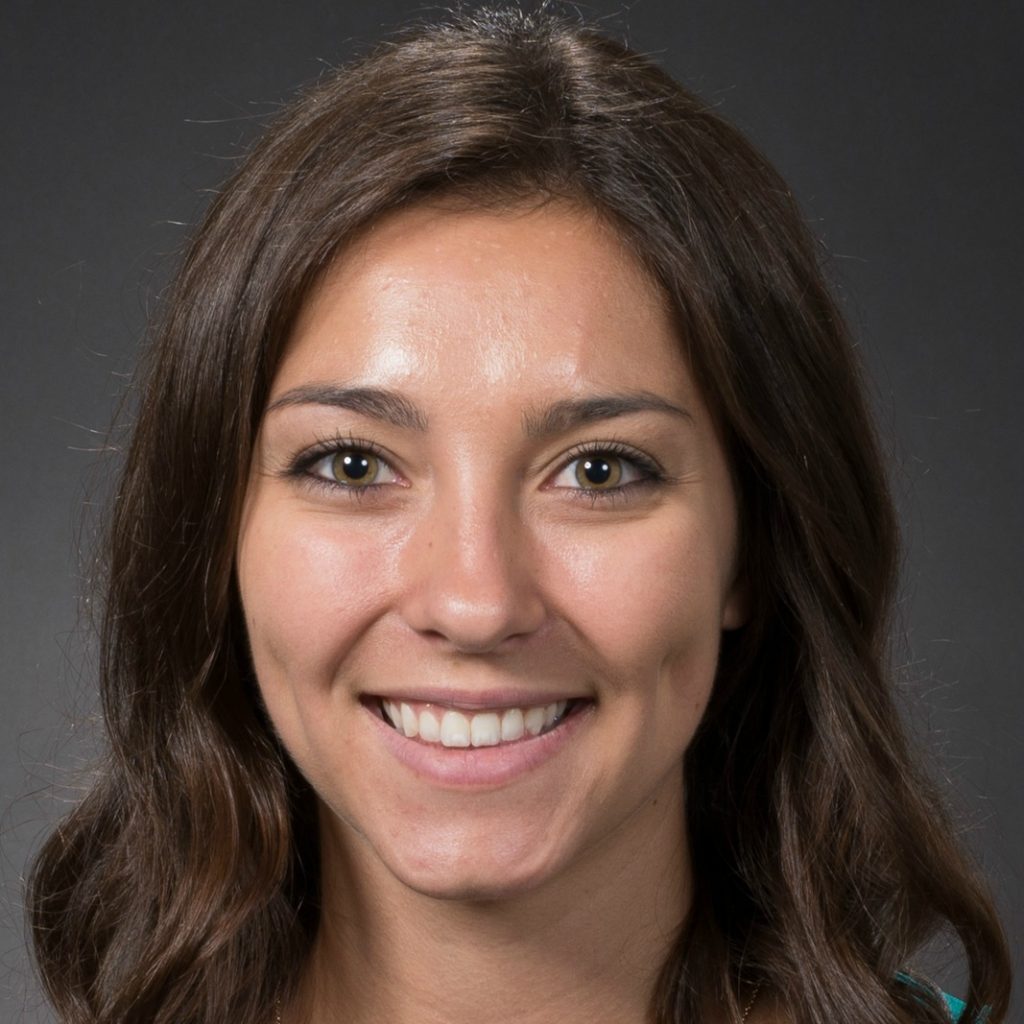September Response
You are a pediatrician who is discussing care with a first-time pregnant couple. You were referred the couple by an obstetrician to establish routine care for the newborn after the delivery. While you are planning the delivery and continued care of the newborn, the family states they do not “want any shots” for their child, including a vitamin K supplementation. Vitamin K is important to prevent hemorrhage and is not produced by newborns, and refusing vitamin K supplementation leads to an increased risk of intracranial hemorrhage and possible long-term cognitive effects.
Considering you will be responsible for the child’s welfare moving forward, how do you respond to the family and/or what actions would you take?
- Accept the family’s desires for their child and their autonomy. Create an alternative plan that will not use a vitamin K injection
- Advise the family that while you do not agree with their wishes, you will continue with their plan so long as they undergo the informed consent of the risks involved and absolve you of liability in any complications
- Refuse to accept the patient in your practice as you believe it would endanger the child. Refer to another provider
- Discuss with the parents their reasons for refusing the shots; if the reasoning appears valid to you, you will accept the patient or vice versa if not valid

There were no comments added to the responses. Overall, there was no leading response or consensus reached. The two most popular answers were (A) Accept the family’s desires for their child and their autonomy. Create an alternative plan that will not use a vitamin K injection and (C) Refuse to accept the patient in your practice as you believe it would endanger the child. Refer to another provider.
As we can see here, there arises an ethical dilemma between respecting the autonomous desires of the family and patient versus preventing short- and long-term harm to the patient. In answer C, referral would be required in order to avoid abandoning the patient without care. The patient is also a newer patient, so there is less of a concern for endangering an established patient-physician relationship.
Clinical Results
This is a fictional case based on real patients from 2013. In the cases, each set of parents refused a vitamin K shot at birth for their infants, who later had cerebral and gastrointestinal bleeding. Infants who do not get the vitamin K shot at birth are at 81 times greater risk for developing Vitamin K deficiency bleeding than infants who do get the shot.
For more information on patient cases and expert opinions, check out the articles in the references below.
Thank you all so much for your participation!
November Question
Martin Albi is a 65-year-old man living with ALS. His disease is advanced; he uses a wheelchair for mobility and has difficulty speaking. His wife, Anne-Marie, who has been his primary caretaker for the last 23 years, often speaks for her husband due to these difficulties. She is a devout Catholic and credits her ability to care for her husband and her optimism to her faith. You recently discovered a mesenchymal stem cell trial that has showed promise in slowing the deleterious effects of ALS. You presented this study to Mr. Albi in the hopes that Mr. Albi would consent to be a member of the study. He showed great interest in the study but could only express that he would like you to discuss the study in the presence of Mrs. Albi when she returns from getting coffee from the hospital café. When Mrs. Albi returns, you excitedly explain to her the proposed benefits of the treatment. However, as soon as you mention stem cell treatment, Mrs. Albi immediately declines, citing the faith that she and Mr. Albi share. She forbids you from discussing or proposing any treatment related to stem cells to her or her husband. This decision is not consistent with Mr. Albi’s previous enthusiasm to pursue a stem cell-based treatment.
What is your next step?
*Click here to tell us your opinion!*
Medical Ethics Editors
 Alexandra Cooke is a medical student at The University of Arizona College of Medicine – Phoenix. She graduated in 2013 from UA with bachelor’s degrees in physiology and international studies. This self-proclaimed global health nerd and news junkie can commonly be found downtown exploring local coffee shops and bookstores or out dancing ballroom or swing with friends. In the future, Alexandra hopes to incorporate her passions (somehow) into her medical career and be able to empower patients. She is one of the co-chairs of the Medical Ethics Interest Group.
Alexandra Cooke is a medical student at The University of Arizona College of Medicine – Phoenix. She graduated in 2013 from UA with bachelor’s degrees in physiology and international studies. This self-proclaimed global health nerd and news junkie can commonly be found downtown exploring local coffee shops and bookstores or out dancing ballroom or swing with friends. In the future, Alexandra hopes to incorporate her passions (somehow) into her medical career and be able to empower patients. She is one of the co-chairs of the Medical Ethics Interest Group.

Bridget Ralston is a member of The University of Arizona College of Medicine – Phoenix Class of 2020. She graduated from Santa Clara University in 2015 with a Bachelor of Science in Chemistry and a French minor. She de-stresses by whipping up delicious treats (and subsequently devouring them), playing soccer, and cuddling with her cat, Tuxedo. She has a particular interest in healthcare for underserved communities, especially children.
Alexandra Cooke and Samuel Timm, MS1's, are The Differential's current medical ethics team. Please visit the Editors section for their contact information and biographies.


